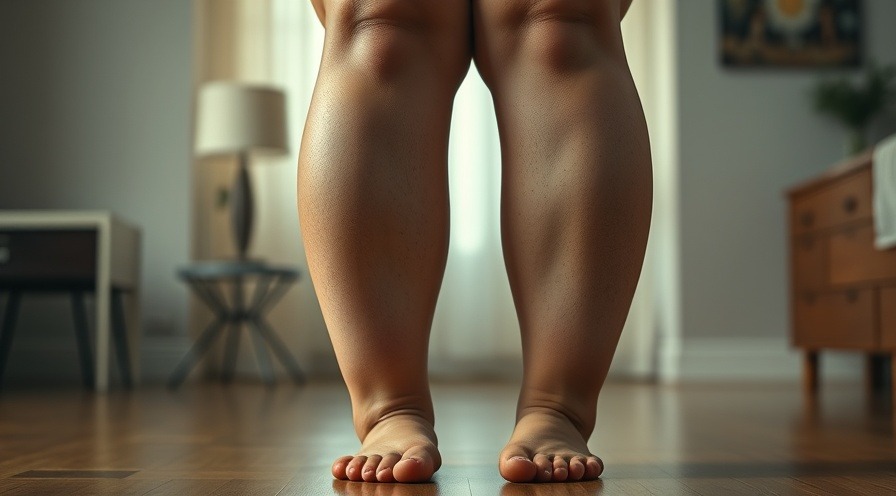
The Growing Concern of Leg Swelling in Seniors
Leg swelling, or edema, is surprisingly common among older adults, with around 20% of individuals over 60 experiencing it regularly. This condition can manifest in various ways, making feet feel tight or giving ankles a puffy appearance. Understanding the underlying causes is crucial, as some everyday habits or dietary choices could be exacerbating the problem. Let’s explore how certain foods and behaviors contribute to swelling in the lower limbs, and what steps can be taken to mitigate the discomfort.
In 'Do THIS Before Bed to Stop Leg Swelling | Barbara O’Neill', the discussion dives into common dietary and lifestyle factors affecting leg swelling, prompting deeper exploration of holistic solutions.
Common Culprits: Foods That Fuel Swelling
Numerous people don’t realize how much sodium they consume inadvertently from processed foods. Hidden salts in canned soups, packaged sauces, and even deli meats pack a punch of sodium that can lead to fluid retention. As we age, our kidneys might struggle to filter this excess sodium effectively, causing the body to hold onto water. To combat this, it’s essential to start reading nutrition labels and opting for low-sodium alternatives wherever possible. Over time, retraining your palate to enjoy meals seasoned with herbs and spices instead of salt can make a significant difference.
Refined Carbs and Sugary Treats: A Recipe for Swelling
In addition to sodium, diets that are rich in refined carbohydrates and added sugars can worsen swelling. Foods such as pastries, sugary drinks, and white bread spike insulin levels in the bloodstream, prompting the body to retain sodium—where sodium goes, water follows. While occasional indulgence might not have dire consequences, regular consumption can lead to elevated inflammation and fluid retention. Swap out these sugary snacks for nutrient-dense alternatives like fruits and whole grains, which can help maintain steady blood sugar levels.
Alcohol Intake: A Double-Edged Sword
Alcohol consumption can significantly impact fluid regulation and exacerbate swelling. Initially, alcohol acts as a diuretic, leading to increased urination and dehydration. In response, the body often retains fluids, which contributes to swelling. Older adults are particularly vulnerable, as they may have slower metabolisms that affect how the body processes alcohol. Moreover, salty snacks often accompany drinking habits, further compounding the risk of edema. Moderating alcohol intake and being consistent with hydration can counteract these effects.
Daily Habits: The Impact of Sedentary Lifestyles
Sitting or standing for prolonged periods can cause gravity to pull fluid down to the legs without movement to circulate it back to the heart. Thus, incorporating simple movements like ankle pumps or short walks can stimulate circulation and reduce swelling. By setting reminders for movement or practicing leg elevation during resting periods, seniors can directly address swelling and improve comfort in their daily lives.
Hydration: A Key Element for Fluid Balance
It may seem counterintuitive, but dehydration can actually worsen fluid retention. When the body senses low fluid levels, it retains more water as a survival mechanism, leading to increased swelling. It's important to consume adequate fluids throughout the day—aiming for light yellow urine as a hydration indicator. However, tailor fluid intake to personal health needs, and consider water-rich foods as part of the diet.
By understanding how dietary choices and lifestyle habits influence leg swelling, seniors can proactively manage and alleviate discomfort. Paying attention to sodium levels, balancing sugars, moderating alcohol, and embracing physical activity will provide noticeable relief over time. Cultivating these habits contributes to a holistic approach to well-being, paving the way to a healthier, more comfortable life.
If you found this article helpful, consider sharing it with friends or family who may also benefit from this information. Together, we can spread awareness on how to manage leg swelling and promote overall health for seniors.
Disclaimer: The information provided on this website is for general informational purposes only and should not be considered medical advice, diagnosis, or treatment. Always consult a qualified healthcare professional before making any decisions or taking actions related to your health, including but not limited to medical conditions, treatments, diets, supplements, or exercise programs. The content on this site is not intended to replace professional medical guidance. The website and its authors are not responsible for any actions taken based on the information provided. Ask your doctor or licensed medical professional.
 Add Row
Add Row  Add
Add 




 Add Row
Add Row  Add
Add 

Write A Comment